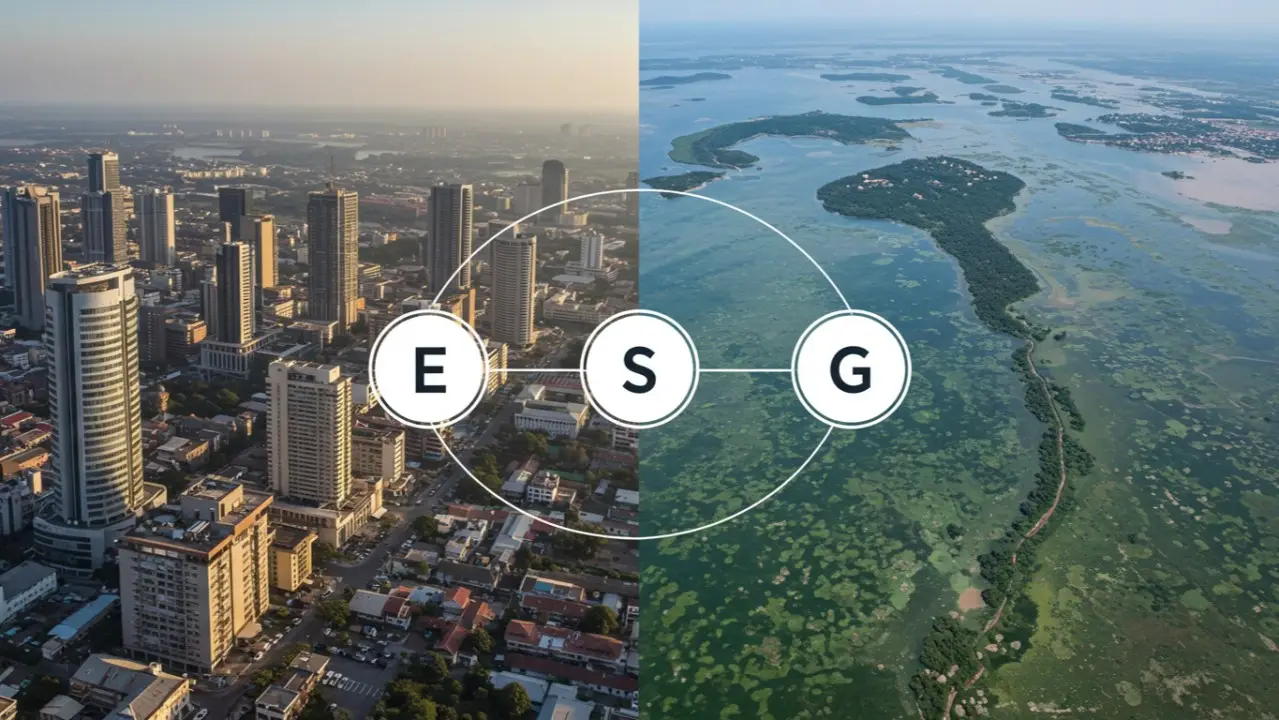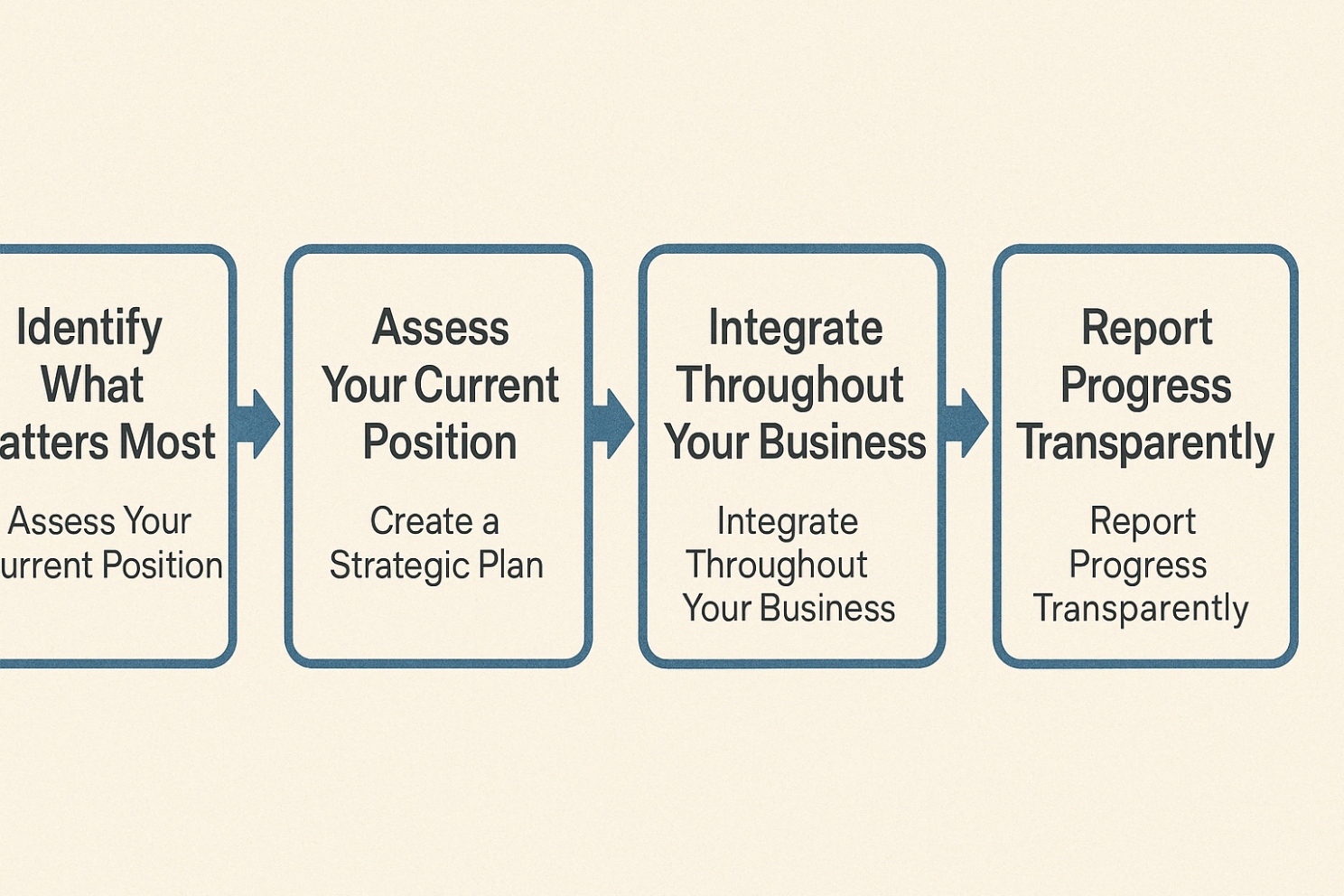#1 ESG: Why It Matters for Nigerian Businesses

ESG stands for Environmental, Social, and Governance. This framework helps businesses measure their impact beyond just making money. It looks at how companies affect the environment, treat people (social), and run their operations (governance).
Environmental, Social, and Governance (ESG) practices have transformed from optional considerations to essential business strategies for Nigerian companies. As global markets, investors, and regulators increasingly prioritise sustainability, Nigerian businesses face urgent challenges and unprecedented opportunities. Companies that embrace ESG principles gain access to global investment, build resilience against climate risks, meet evolving regulations, and create lasting value for all stakeholders. Nigerian businesses that proactively integrate ESG into their core operations won’t just survive in the changing business landscape—they’ll thrive, gaining competitive advantages while contributing to national development goals.
What is ESG?

ESG stands for Environmental, Social, and Governance. This framework helps businesses measure their impact beyond just making money. It looks at how companies affect the environment, treat people (social), and run their operations (governance).
Why ESG Matters in Nigeria Now

Nigerian businesses face growing pressure to adopt ESG practices because:
- Global Investment Trends: Over $35 trillion in global investments now follow ESG criteria. Investors check if Nigerian companies meet these standards before investing.
- Climate Change Risks: Nigeria could lose up to 30% of its GDP by 2050 due to climate impacts if businesses don’t take action now.
- Changing Regulations: The Nigerian Exchange, the Central Bank, and other authorities have created new guidelines that expect companies to be more responsible and transparent.
- Business Resilience: Companies using ESG principles handle Nigeria’s unique challenges better, from supply chain issues to environmental problems.
The Three Parts of ESG for Nigerian Companies
Environmental (E)
This measures how businesses interact with the natural world:
- Using energy efficiently and switching to cleaner sources
- Reducing pollution from operations
- Managing waste through recycling and reuse
- Using water responsibly
- Protecting local plants and animals
- Preparing for climate challenges like flooding and coastal erosion
Social (S)
This evaluates how businesses treat people and communities:
- Ensuring fair treatment and safety for workers
- Engaging with local communities, especially in regions like the Niger Delta
- Protecting customer and employee data
- Promoting diversity that reflects Nigeria’s many cultures and backgrounds
Governance (G)
This examines how businesses are managed and led:
- Building effective and diverse leadership teams
- Creating strong anti-corruption policies
- Being transparent about company activities and decisions
- Following regulations consistently
- Protecting the rights of all shareholders
Benefits of ESG for Nigerian Businesses

Taking ESG seriously offers important advantages:
- Access to Investment: Companies with good ESG practices attract more funding from both local and international investors.
- Better Risk Management: ESG helps identify and manage problems before they become serious, from environmental disasters to community conflicts.
- Stronger Stakeholder Relations: Meeting the expectations of customers, employees, and communities builds loyalty and trust.
- Maintaining Community Support: For industries like mining or oil, showing a positive impact is essential for local acceptance.
- Competitive Edge: ESG drives innovation and helps companies stand out, especially as Nigeria engages more with African and global markets.
Key ESG Focus Areas for Nigerian Companies

For the Environment:
- Contributing to Nigeria’s climate change commitments
- Investing in renewable energy solutions
- Creating water conservation programs
- Reducing waste through recycling and reuse
- Building infrastructure that can withstand climate impacts
For People and Communities:
- Creating jobs and training opportunities for young Nigerians
- Ensuring ethical practices throughout supply chains
- Developing meaningful community support programs
- Promoting diversity at all company levels
- Maintaining high health and safety standards
For Good Governance:
- Implementing strong anti-bribery measures
- Ensuring independent oversight of company activities
- Providing clear and honest reporting
- Protecting the rights of all investors
- Contributing to Nigeria’s reputation for good business practices
The Business Value of ESG Leadership

Companies that excel at ESG can expect:
- Enhanced reputation among customers and partners
- Reduced risks and fewer unexpected problems
- Advantage in attracting investments and talent
- Lower costs through efficient resource use
- Better relationships with government and communities
- Stronger financial performance over time
How to Start Your ESG Journey

- Identify What Matters Most: Determine which ESG issues are most relevant to your specific business and industry in Nigeria.
- Assess Your Current Position: Measure where you stand now and compare against similar companies.
- Create a Strategic Plan: Set clear, measurable goals that align with your business objectives.
- Integrate Throughout Your Business: Make ESG considerations part of every decision, from the boardroom to daily operations.
- Report Progress Transparently: Regularly share your achievements and challenges using recognized reporting frameworks.
Remember that ESG is an ongoing process of improvement, not a one-time project.
Conclusion

For Nigerian businesses, ESG isn’t just about compliance or looking good—it’s becoming essential for long-term success. By turning sustainability challenges into opportunities, companies can build stronger, more resilient businesses that create value for shareholders while contributing positively to Nigeria’s future.
Ready to make ESG work for your Nigerian business? Let Teasoo Consulting help you understand the risks, seize the opportunities, and build a sustainable future.






